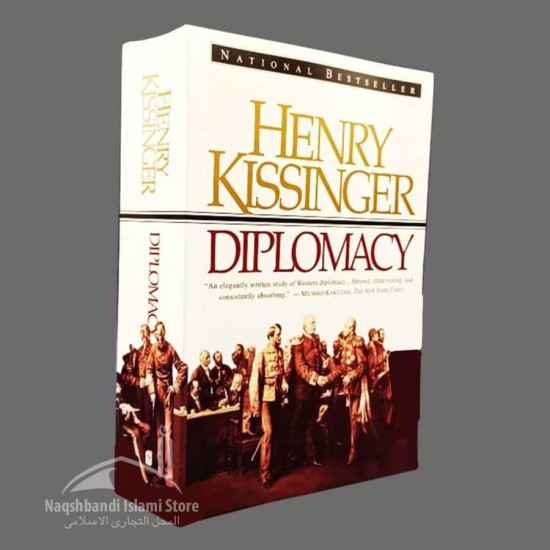
- Model: ibe-66
- SKU: ibe-66
Diplomacy by Henry Kissinger
Diplomacy is a 1994 book written by former National Security Advisor and Secretary of State Henry Kissinger. It is a sweep of the history of international relations and the art of diplomacy, largely concentrating on the 20th century and the Western World. Kissinger, as a great believer in the realist school of international relations, focuses strongly upon the concepts of the balance of power in Europe prior to World War I, raison d'État, and Realpolitik throughout the ages of diplomatic relations. Kissinger also provides insightful critiques of the counter realist diplomatic tactics of collective security, developed in the Charter of the League of Nations, and self-determination, also a principal of the League. Kissinger also examines the use of the sphere of influence arguments put forth by the Soviet Union in Eastern and Southern Europe after World War II; an argument that has been maintained by contemporary Russian foreign relations with regard to Ukraine, Georgia, and other former Soviet satellites in Central Asia.
The history begins in Europe in the 17th century but quickly advances up to the World Wars and then the Cold War. Kissinger refers to himself numerous times in the book, especially when recounting the Richard Nixon and Gerald Ford presidencies.
Kissinger dedicated the book to the men and women of the United States Foreign Service.
Chapters
The New World Order
The Hinge: Theodore Roosevelt or Woodrow Wilson
From Universality to Equilibrium: Richelieu, William of Orange, and Pitt
The Concert of Europe: Great Britain, Austria, and Russia
Two Revolutionaries: Napoleon III and Bismarck
Realpolitik Turns on Itself
A Political Doomsday Machine: European Diplomacy Before the First World War
Into the Vortex: The Military Doomsday Machine
The New Face of Diplomacy: Wilson and the Treaty of Versailles
The Dilemmas of the Victors
Stresemann and the Re-emergence of the Vanquished
The End of Illusion: Hitler and the Destruction of Versailles
Stalin's Bazaar
The Nazi-Soviet Pact
America Re-enters the Arena: Franklin Delano Roosevelt
Three Approaches to Peace: Roosevelt, Stalin, and Churchill in World War II
The Beginning of the Cold War
The Success and the Pain of Containment
The Dilemma of Containment: The Korean War
Negotiating with the Communists: Adenauer, Churchill, and Eisenhower
Leapfrogging Containment: The Suez Crisis
Hungary: Upheaval in the Empire
Khrushchev's Ultimatum: The Berlin Crisis 1958-63
Concepts of Western Unity: Macmillan, de Gaulle, Eisenhower, and Kennedy
Vietnam: Entry into the Morass; Truman and Eisenhower
Vietnam: On the Road to Despair; Kennedy, and Johnson
Vietnam: The Extrication; Nixon
Foreign Policy as Geopolitics: Nixon's Triangular Diplomacy
Détente and Its Discontents
The End of the Cold War: Reagan and Gorbachev
The New World Order Reconsidered










-80x80w.png)
























-250x250.jpg)
